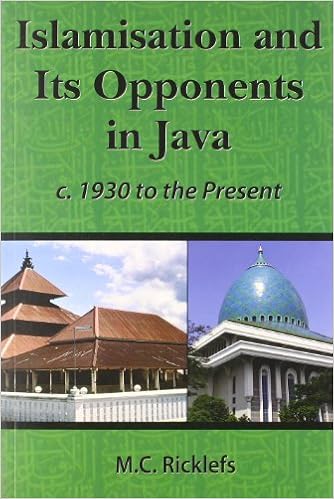Islamisation and its opponents in Java a political, social, cultural and religious history, c. 1930 to the present
- Paperback: 598 pages
- Publisher: University of Hawaii Press (September 30, 2012)
- Language: English
- ISBN-10: 0824837339
- ISBN-13: 978-0824837334
- Bentuk File : PDF dari Penerbit
- Sampel PDFnya sebagai bukti : https://app.box.com/s/k8eu1mg6syvopjc4fp15q93h21w1dw41
- Harga : Rp 100.000 (jika berminat pesan silakan SMS atau Nama Pemesan + Judul Ebook ke 08572-1011-846 Atau Whatsapp (WA) : 082350057595, Prosedur berikutnya bakal diinfokan lebih lanjut.
Full Halaman dari EBOOK akan dikirim by email.)
The Javanese - one of the largest ethnic
groups in the Islamic world - were once mostly 'nominal Muslims', with
pious believers a minority and the majority seemingly resistant to
Islam's call for greater piety. Over the tumultuous period analyzed here
- from colonial ruler through Japanese occupation and Revolution to the
chaotic democracy of the Sukarno period, the Soeharto regime's aspirant
totalitarianism and the democratic period since - that society has
changed profoundly to become an extraordinary example of the rising
religiosity that marks the modern age.
Islamisation and Its Opponents in Java draws on a formidable body of sources, including interviews, archival documents and a vast range of published material, to situate the Javanese religious experience from the 1930s to the present day in its local political, social, cultural and religious settings. The concluding part of the author's monumental three-volume series assessing more than six centuries of the on-going Islamisation of Javanese, the study has considerable relevance for much wider contexts. Beliefs, or disbeliefs, about the supernatural are important in all societies, and the final section of the book, which considers the significance of Java's religious history in global contexts, shows how it exemplifies a profound contest of values in the universal human search for a better life.
Islamisation and Its Opponents in Java draws on a formidable body of sources, including interviews, archival documents and a vast range of published material, to situate the Javanese religious experience from the 1930s to the present day in its local political, social, cultural and religious settings. The concluding part of the author's monumental three-volume series assessing more than six centuries of the on-going Islamisation of Javanese, the study has considerable relevance for much wider contexts. Beliefs, or disbeliefs, about the supernatural are important in all societies, and the final section of the book, which considers the significance of Java's religious history in global contexts, shows how it exemplifies a profound contest of values in the universal human search for a better life.

Tidak ada komentar:
Posting Komentar